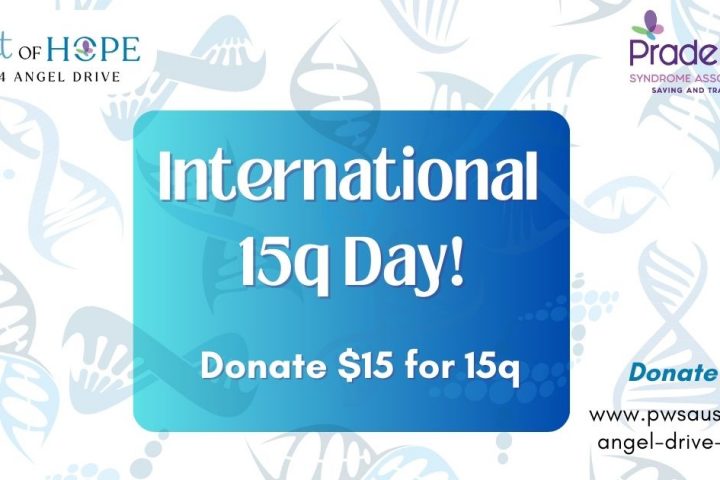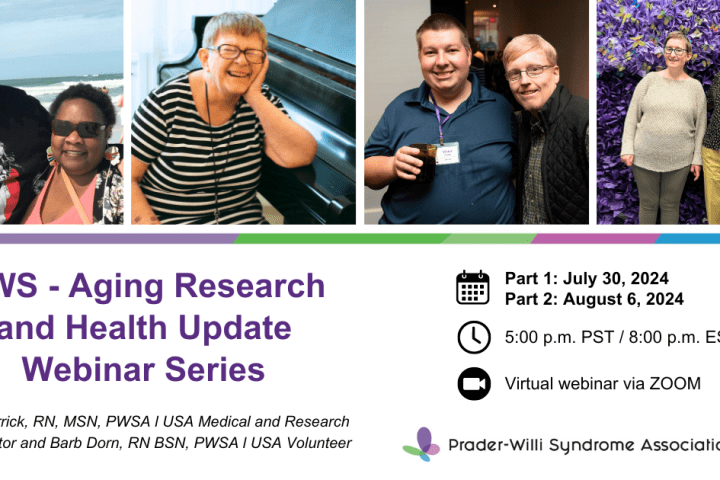 The pandemic has been a mixed bag for the PWS community. For some individuals, mental health has suffered, isolation has increased, and opportunities for engagement and inclusion have been limited. For others, former anxieties and struggles have been alleviated, and new hobbies and interests have developed. There are fewer opportunities to access food, but also fewer opportunities for activity and movement. Day programs are not currently an option for many, but many did not like their day program and now know it is not necessary to attend. Change of routine can be upsetting for many with PWS, but this population is also accustomed to structured restrictions and is therefore primed for resilience.
The pandemic has been a mixed bag for the PWS community. For some individuals, mental health has suffered, isolation has increased, and opportunities for engagement and inclusion have been limited. For others, former anxieties and struggles have been alleviated, and new hobbies and interests have developed. There are fewer opportunities to access food, but also fewer opportunities for activity and movement. Day programs are not currently an option for many, but many did not like their day program and now know it is not necessary to attend. Change of routine can be upsetting for many with PWS, but this population is also accustomed to structured restrictions and is therefore primed for resilience.
Both physical and mental health conditions are prevalent for individuals with PWS, so a great challenge for support persons has been delicately balancing health department restrictions with what is important to and for the supported individual. Perhaps it is physically safer to avoid going to visit relatives, but at what cost to mental and emotional well-being? The limitation on time with family and friends and the lack of being out in the community have certainly been the most detrimental aspects of the pandemic. COVID has disrupted many traditions and events that folks with PWS look forward to every year. It is hard to create a sense of joy and excitement when every day is spent stuck at home. Having staff that are really invested in supporting our individuals remains more important than ever now that staff are doing far more than ever and for many is the only source of outside interaction. Phone calls, cards, letters and packages help remind people that even though there are limits on our movement and gathering, they are still loved and appreciated.
Contributed by Lynn Garrick, RN, BSN, Program Director, QDDP
AME Community Services
W: http://amecommunity.com
E: lynn@amecommunity.com





 Jennifer Bolander has been serving as a Special Education Specialist for PWSA (USA) since October of 2015. She is a graduate of John Carroll University and lives in Ohio with her husband Brad and daughters Kate (17), and Sophia (13) who was born with PWS.
Jennifer Bolander has been serving as a Special Education Specialist for PWSA (USA) since October of 2015. She is a graduate of John Carroll University and lives in Ohio with her husband Brad and daughters Kate (17), and Sophia (13) who was born with PWS. Perry A. Zirkel has written more than 1,500 publications on various aspects of school law, with an emphasis on legal issues in special education. He writes a regular column for NAESP’s Principal magazine and NASP’s Communiqué newsletter, and he did so previously for Phi Delta Kappan and Teaching Exceptional Children.
Perry A. Zirkel has written more than 1,500 publications on various aspects of school law, with an emphasis on legal issues in special education. He writes a regular column for NAESP’s Principal magazine and NASP’s Communiqué newsletter, and he did so previously for Phi Delta Kappan and Teaching Exceptional Children. Evan has worked with the Prader-Willi Syndrome Association (USA) since 2007 primarily as a Crisis Intervention and Family Support Counselor. Evans works with parents and schools to foster strong collaborative relationships and appropriate educational environments for students with PWS.
Evan has worked with the Prader-Willi Syndrome Association (USA) since 2007 primarily as a Crisis Intervention and Family Support Counselor. Evans works with parents and schools to foster strong collaborative relationships and appropriate educational environments for students with PWS. Dr. Amy McTighe is the PWS Program Manager and Inpatient Teacher at the Center for Prader-Willi Syndrome at the Children’s Institute of Pittsburgh. She graduated from Duquesne University receiving her Bachelor’s and Master’s degree in Education with a focus on elementary education, special education, and language arts.
Dr. Amy McTighe is the PWS Program Manager and Inpatient Teacher at the Center for Prader-Willi Syndrome at the Children’s Institute of Pittsburgh. She graduated from Duquesne University receiving her Bachelor’s and Master’s degree in Education with a focus on elementary education, special education, and language arts. Staci Zimmerman works for Prader-Willi Syndrome Association of Colorado as an Individualized Education Program (IEP) consultant. Staci collaborates with the PWS multi-disciplinary clinic at the Children’s Hospital in Denver supporting families and school districts around the United States with their child’s Individual Educational Plan.
Staci Zimmerman works for Prader-Willi Syndrome Association of Colorado as an Individualized Education Program (IEP) consultant. Staci collaborates with the PWS multi-disciplinary clinic at the Children’s Hospital in Denver supporting families and school districts around the United States with their child’s Individual Educational Plan. Founded in 2001, SDLC is a non-profit legal services organization dedicated to protecting and advancing the legal rights of people with disabilities throughout the South. It partners with the Southern Poverty Law Center, Protection and Advocacy (P&A) programs, Legal Services Corporations (LSC) and disability organizations on major, systemic disability rights issues involving the Individuals with Disabilities Education Act (IDEA), Americans with Disabilities Act (ADA), and the federal Medicaid Act. Recently in November 2014, Jim retired.
Founded in 2001, SDLC is a non-profit legal services organization dedicated to protecting and advancing the legal rights of people with disabilities throughout the South. It partners with the Southern Poverty Law Center, Protection and Advocacy (P&A) programs, Legal Services Corporations (LSC) and disability organizations on major, systemic disability rights issues involving the Individuals with Disabilities Education Act (IDEA), Americans with Disabilities Act (ADA), and the federal Medicaid Act. Recently in November 2014, Jim retired.